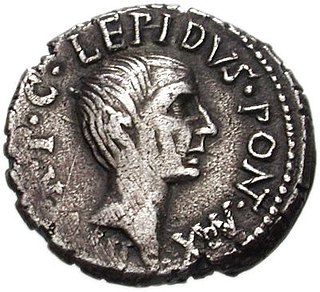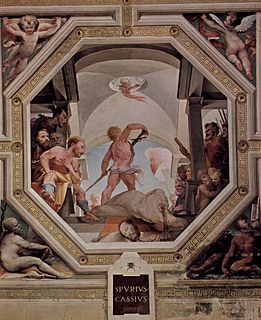 W
WThe Master of the Horse was a position of varying importance in several European nations.
 W
WMarcus Aemilius Lepidus was a Roman general and statesman who formed the Second Triumvirate alongside Octavian and Mark Antony during the final years of the Roman Republic. Lepidus had previously been a close ally of Julius Caesar. He was also the last Pontifex Maximus before the Roman Empire.
 W
WMarcus Antonius, commonly known in English as Mark Antony or Anthony, was a Roman politician and general who played a critical role in the transformation of the Roman Republic from a constitutional republic into the autocratic Roman Empire.
 W
WSpurius Cassius Vecellinus or Vicellinus was one of the most distinguished men of the early Roman Republic. He was three times consul, and celebrated two triumphs. He was the first magister equitum, and the author of the first agrarian law. The year following his last consulship, he was accused of aiming at regal power, and was put to death by the patricians.
 W
WAulus Cornelius Cossus was a Roman general from the early Republic. He is most famous for being the second Roman, after Romulus, to be awarded the spolia opima, Rome's highest military honor, for killing the commander of an enemy army in single combat. Only four Romans ever achieved this feat, but the final winner was officially denied the honor by a jealous Consul Caesar Octavianus who insisted the honor was limited exclusively to Roman commanders. Cornelius Cossus proves otherwise.
 W
WGaius Flaminius C. f. L. n. was a leading Roman politician in the third century BC. Twice consul, in 223 and 217, Flaminius is notable for the Lex Flaminia, a land reform passed in 232, the construction of the Circus Flaminius in 221, and his death at the hands of Hannibal's army at the Battle of Lake Trasimene in 217, during the Second Punic War. Flaminius is celebrated by ancient sources as being a skilled orator and a man possessed of great piety, strength, and determination. He is, however, simultaneously criticised by ancient writers such as Cicero and Livy for his popular policies and disregard of Roman traditions, particularly during the terms of his tribunate and second consulship.
 W
WAulus Postumius Tubertus was a Roman military leader in the wars with the Aequi and Volsci during the fifth century BC. He served as Magister Equitum under the dictator Mamercus Aemilius Mamercinus in 434 BC.
 W
WQuintus Publilius Philo was a Roman politician who lived during the 4th century BC. His birth date is not provided by extant sources, however, a reasonable estimate is about 365 BC, since he first became consul in 339 BC at a time when consuls could be elected in their twenties. His Greek cognomen ‘Philo’ was unique to his family.
 W
WGaius Servilius Ahala was a 5th-century BC politician of ancient Rome, considered by many later writers to have been a hero. His fame rested on the contention that he saved Rome from Spurius Maelius in 439 BC by killing him with a dagger concealed under an armpit. This may be less historical fact and more etiological myth, invented to explain the Servilian cognomen "Ahala"/"Axilla", which means "armpit" and is probably of Etruscan origin.